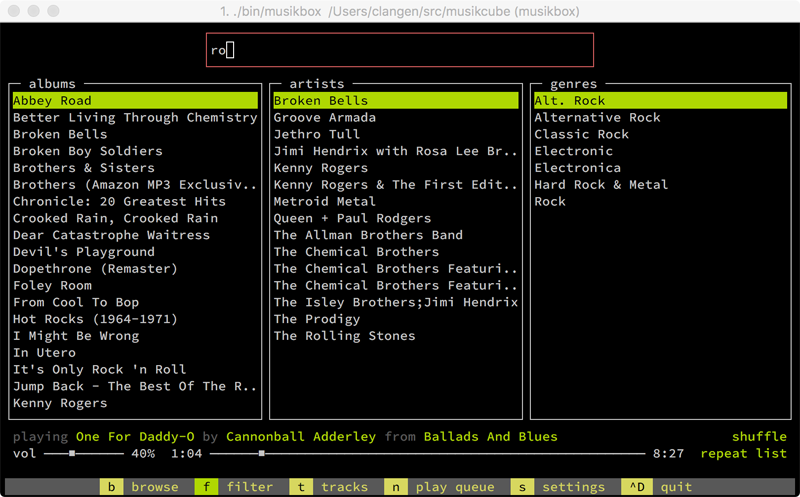|
|
||
|---|---|---|
| src | ||
| .gitignore | ||
| archive-macos.sh | ||
| archive-win32.sh | ||
| CHANGELOG.txt | ||
| CMakeLists.txt | ||
| CONTRIBUTORS.txt | ||
| LICENSE.txt | ||
| musikcube.sln | ||
| README.md | ||
musikcube
a cross-platform audio engine and player written in c++.
musikbox
a curses frontend to musikcube.
musicbox compiles and runs easily on windows, macos and linux. it also runs well on a raspberry pi with raspbian, and can be setup as a streaming audio server.
it looks something like this on windows:
and this on macos:
and on linux:
you can also stream audio from, or remote control musikbox using the musikdroid android app, which can be downloaded in the releases section above. it looks like this:
raspberry pi
want to run musikbox on a raspberry pi, connected to you home stereo? see here.
streaming server documentation
if you're interested in writing your own frontend, api documentation is available here. the streaming server api uses a combination of websockets and vanilla http, and is included in every musikbox distribution.
compiling
windows
- grab the Visual Studio 2017 Community Edition and install the 32-bit c++ compiler.
- clone the musikcube sources:
git clone https://github.com/clangen/musikcube.git - install the 32 bit version of boost 1.64. ensure it shares the same parent directory with musikcube. e.g:
c:\src\musikcubeandc:\src\boost_1_64_0-- the project's solution will reference it via relative path. - open
musikcube.slnand build/run.
mac
you'll need homebrew to install the required dependencies.
automatic
brew tap clangen/musikboxbrew install musikboxmusikbox
manual
brew install cmake boost libogg libvorbis flac faad2 libmicrohttpd lamegit clone https://github.com/clangen/musikcube.gitcd musikcubecmake .makecd bin./musikbox
linux
- install the following libraries and their development packages:
cmake boost libogg vorbis flac faad2 ncurses zlib asound pulse libcurl libmicrohttpd libmp3lame git clone https://github.com/clangen/musikcube.gitcd musikcubecmake .makesudo make installmusikbox
keyboard shortcuts
the hotkeys listed below can generally be used at any time; however, if an input field is focused some may not work. you can enter command mode by pressing ESC, which will highlight the bottom command bar and accept all hotkeys. command mode may be deactivated by pressing ESC again.
you may also change hotkeys by editing ~/.musikcube/hotkeys.json and restarting the app. a hotkey tester is provided in the settings screen.
TABselect next windowSHIFT+TABselect previous window~switch to console viewaswitch to library viewsswitch to settings viewivolume up 5%kvolume down 5%mtoggle volume mutejprevious tracklnext trackuback 10 secondsoforward 10 secondsvshow / hide visualizerrrepaint the screen.toggle repeat mode (off/track/list),(un)shuffle play queueCTRL+ppause/resume (globally)CTRL+xstop (unload streams, free resources)CTRL+dquit
and a couple hotkeys that are specific to the library view:
bshow browse viewnshow play queuefshow album/artist/genre searchtshow track search1browse by artist2browse by album3browse by genre4browse by album artist5browse by playlistM-ncreate a new empty playlistM-ssave the currently selected playlistDEL(BACKSPACEon macos) in the playlists pane: delete the selected playlistM-rrename the selected playlistM-UP(CTRL-UPon macos) move the selected track upM-DOWN(CTRL-DOWNon macos) move the selected track downDEL(BACKSPACEon macos) in the tracks pane: delete the selected track
xjump to playing artist/album/genre in browse viewM-ENTERshow a context menu for the currently selected item (album, artist, genre, track)SPACEpause/resume
you can manipulate the play play queue as follows:
M-ssave current queue as a playlistM-lload a previously saved playlistM-xdelete a previously saved playlistM-rrename a playlistM-UP(CTRL-UPon macos) move the selected track upM-DOWN(CTRL-DOWNon macos) move the selected track downDEL(BACKSPACEon macos) delete the selected track
a couple important notes:
- on macos make sure you configure your terminal emulator to treat your left alt key as "+Esc" or "Meta"
ALTis theModifier key in the windows build
sdk
the musikcube sdk is a set of small, pure-virtual c++ classes and a handful of enums and constants. they're still in the process of being refined. you can see what they currently look like here: https://github.com/clangen/musikcube/tree/master/src/core/sdk
dependencies
musikcube would not be possible without the following excellent free, open source, and (in the case of some macos and win32 APIs) non-free projects and libraries:
core:
ui:
decoders:
outputs:
metadata-related:
networking:
miscellaneous



